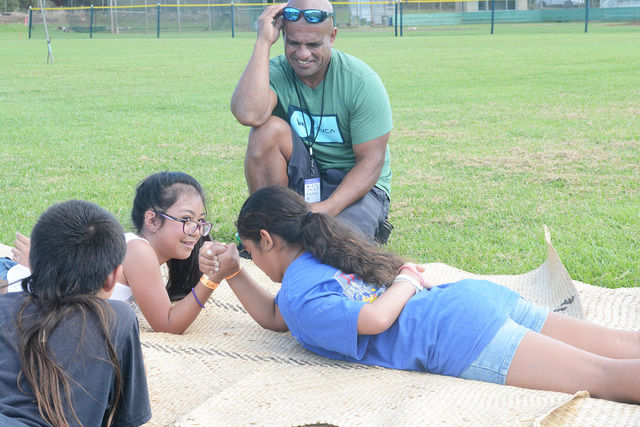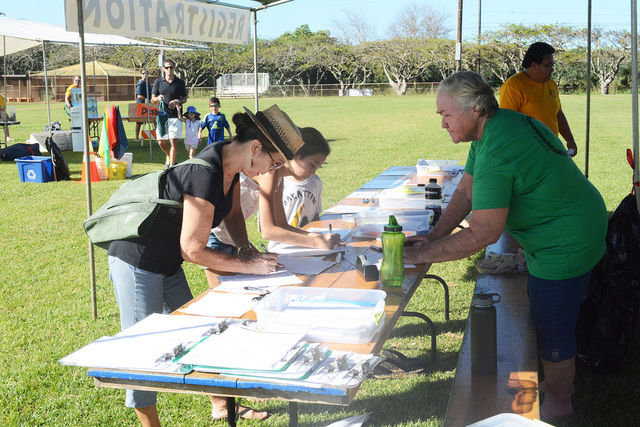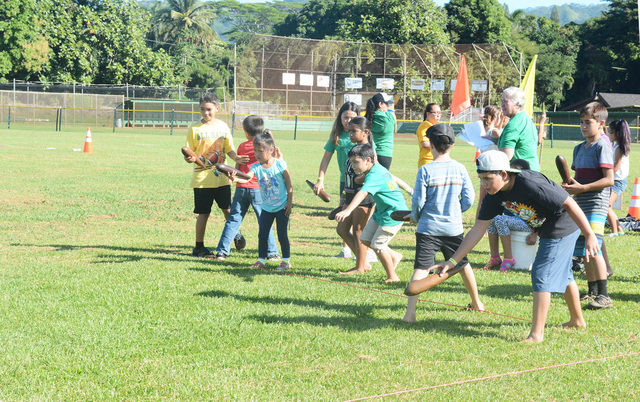KOLOA — For Leihi’ilani Kirkpatrick, Saturday’s Ka Moku O Manokalanipo Paani Makahiki, an event that featured ancient Hawaiian games and cultural demonstrations, was a sign of renaissance.
“We lost our language and culture because we weren’t allowed to practice it, but now there’s a push to go back to our roots and better understand them,” Kirkpatrick said. “I didn’t have events like this growing up.”
The renaissance began in the 1970s, and “is still happening,” she said.
Kirkpatrick, a Hawaiian language teacher on Kauai, was one of dozens of spectators at Saturday’s Hawaiian Games, which has its roots in the Makahiki season, an ancient Hawaiian festival that celebrated the harvest and honored Lono, the god of rain. In ancient times, the festival marked a 4-month stop to hard labor and war, Kirkpatrick said.
“So the Hawaiians worked very hard for eight months, to gather offerings and getting food ready for Makahiki,” she said.
The Makahiki season started in November with the first sighting of the Pleiades constellation. The season marked a time of rough seas, high winds and heavy rain, and ended in February. It was a time to pay tithes to the chief, according to a Hawaii history website.
Once the tithes were collected, communities celebrated with games and feasts.
Makahiki was a time to come together, rest and take part in competitive games, Kirkpatrick said.
“It was like their Olympics,” she said.
Common games played during that time were Haka Moa, Ulu Maika, o’o lhe, Moa Pahee and Uma, said Ka’e’e Ahloo, a member of Ahahui Kiwila Hawaii O Moikeha, a Hawaiian civic club on Kauai.
“The games were traditionally used to train for battle during peacetime,” said Ahloo, a Hawaiian language teacher. “Even Ulu Maika, which is like bowling, was used to practice breaking legs.”
Ahahui Kiwila Hawaii O Moikeha is trying to bring back some of those games, and more.
“This event is a way to perpetuate Hawaiian culture,” said Julie Kanealii, club secretary.
This year was the third year the Ka Moku O Manokalanipo Paani Makahiki event was held. The location changes every year, Kanealii said.
On Saturday, the event was held at the Anne Knudsen Park in Koloa. But the games, which were previously held in Hanalei and Kapaa, will be held in Waimea next year, she said.
“During the Makahiki season, people would travel around the island, collecting tributes for the chief, so we’re trying to keep it as close to the season as possible by going around to different communities each year,” Kanealii said.
Kauai residents appreciate the event, and some are yearly participants, she said.
“It’s growing every year, and they appreciate that,” she said.
Saturday’s games were open to people of all ages, and participants had their pick of 10 games, that were separated into age groups.
“There were more games played during the Makahiki season, but we just chose 10,” Kanealii said.
The event wasn’t just about the games, however. A craft fair, featuring 11 local businesses such as Tiki Pet Collars and Maddy & Addy’s Animals, provided event-goers with the opportunity to support small businesses.
With this year’s event over, Kanealii is already looking to 2017.
“I start planning for the next year as soon as possible,” she said.
Next year’s games will be held on Feb. 4, 2017, at the Waimea Athletic Field.






